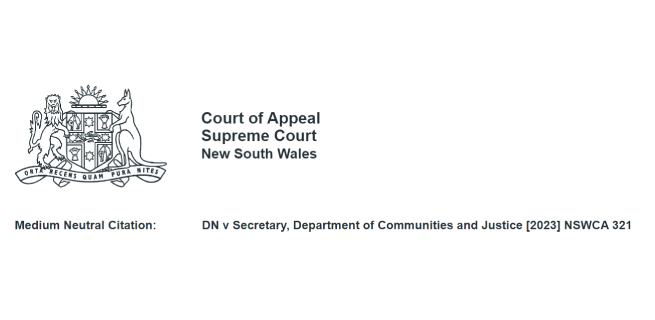Wiradjuri woman DN came to the notice of the NSW welfare officers in October 2009, which led to the imposition of a care order in relation to her two children, under the terms of section 61 of the Children and Young Persons (Care and Protection) Act 1998 (NSW) (the Care Act).
The New South Wales Children’s Court gave the minister sole parenting responsibility for DN’s two children in August 2010, which was to hold until they turned 18 years of age. And as the New South Wales Court of Appeal (NSWCA) equity division heard last year, an initial placing with a maternal aunt was not long-lasting.
Further placements with Indigenous families were difficult to maintain as well. But in December 2017, Aboriginal agency KARI worker Ms M learnt of the First Nations siblings and that they might be separated, and on applying, she and her husband, Mr L, were approved as authorised carers.
M and L, however, are British and were in NSW due to the latter’s working visa, which expired in 2019. So, M then returned to the UK with L and the Wiradjuri kids.
But M was required to return to Australia in 2020 with the kids. Although, as she struggled, she was permitted to go back to the UK with them and subsequently COVID-19 prevented her returning once more to this country with the children as she had been required to.
On learning of her kid’s departure, DN applied for a return of parental responsibility in April 2020, and in March 2021, the British couple filed for the same. And when the Children’s Court heard both applications in June 2022, it granted sole responsibility of the Wiradjuri kids to the couple in the UK.
Appealing removal to another country
DN sought permission to appeal these orders to the NSW Court of Appeal on 30 October 2023, based on whether the NSW Children’s Court has jurisdiction to make orders in respect to children living overseas and whether carers living outside of NSW are a suitable placement for local kids.
In the 19 December court findings, NSWCA Justice John Basten outlined that the orders that granted parental responsibility of the Aboriginal children to the UK couple came with stipulations requiring ongoing ministerial assessments of the kid’s living situation, but it was unclear how this would occur.
His Honour also noted that regarding DN’s application, no orders were made but rather those relating to the British couple were supposed to “dismiss her application”. And he also explained that legal representatives appeared for both children in June 2022 but neither said anything in court.
And an initial challenge to appeal the Children’s Court 2022 ruling, which was heard by the NSW Supreme Court last June, saw NSWSC Justice Francois Kunc dismiss both DN’s grounds of contention, which were again raised before Basten and his fellow NSWCA justices last October.
A matter of jurisdiction
Justice Basten points out that section 12 of the Children’s Court Act 1987 (NSW) (the Court Act), outlines the court’s jurisdiction generally, which includes that conferred by the Court Act and any other legislation pertaining to the court.
His Honour then adds that the powers bestowed upon the Children’s Court under part 5 of the Act “should be understood as having the dual function of conferring jurisdiction and power”.
DN submitted that section 4 of the Care Act imposes a constraint on jurisdiction, as it grants functions that relate to children and young persons living in NSW, not ordinarily living in the state but present in it, or those subject to an event or circumstances in NSW that give rise to a report.
In terms of the grounds that allow for the granting of a care order, eight are set out in section 71 of the Care Act.
DN’s challenge related to the care order that M and L applied for in March 2021, which was then granted by the NSW Children’s Court in June 2022.
According to the magistrate, the kids were still “subject to an event or circumstances” in NSW, and, therefore, the court still retained jurisdiction, which was to be considered broadly, and as children were involved, a dynamic approach was to be taken, whilst the 2010 care order had been valid.
So, the court ordered in June 2022 that parental responsibility for Wiradjuri children remain with M and L whilst they were all still residing in the UK.
Extraterritorial jurisdiction
In terms of reach, Justice Basten outlined a number of factors important to this case. These include the Children’s Court being a specialist court with limited jurisdiction and that this was not a narrow reading of the terms of the court’s operations, while there were also constitutional considerations.
Provisions of the Care Act, and the Court Act, his Honour made clear, “should not be construed as conferring a greater jurisdiction on the Children’s Court than is consistent with the division of powers between state and Commonwealth institutions”.
Section 12 of the Court Act, the justice continued, ensures that the exercise of jurisdiction only pertains to the state of NSW, which left a question as to whether the jurisdiction extended to the Children’s Court within the Care Act allows it to reach across borders.
His Honour then referred to the 1997 review of the Act that the Care Act replaced, which stipulated that the new bill should confer a duty to “children or young people who live in NSW or are physically present in NSW” or whether their normal place of residence is in this state or they go to school here.
The justice then considered the section 4 provision that those “subject to an event or circumstances occurring” in NSW “that gives or give rise to a report” are captured by the Act and found that other sections relating to reports infer that they’re to be produced prior to exercising statutory function.
There are also laws contained under section 14A of the Care Act that permit children and young persons in care to be transferred to other states or territories or to New Zealand. However, these do not relate to children who are already outside of NSW at the time of issuance.
The question of presence
As to whether the Children’s Court can confer parental responsibility on a person not living in NSW or present within the state at the time an order was made, there are several reasons to conclude that this is not permissible.
Firstly, NSW courts aren’t established to issue cross jurisdictional judgements, especially to other countries. Secondly, the court can’t grant the minister care powers to exercise overseas. And thirdly, initial orders thought to hold until 18 years of age, fail to consider changes in life circumstances.
“For these reasons the jurisdiction conferred on the Children’s Court should be understood as limited to its exercise with respect to children who are present, or ordinarily living, in the jurisdiction of the court, that is New South Wales, when the order is made,” Justice Basten determined.
The ruling
His Honour added that DN’s submission that the court did not have jurisdiction to make orders in regard to children in the UK was upheld. And following from that, on 19 December last year, he ordered that the June 2022 rulings of the court in relation to the Wiradjuri children be quashed.
And in regard to whether people overseas who have no right to live in NSW were suitable for placement, again this contention triggered the same restrictions as did the question of jurisdiction, which meant that it too was made out.
In regard to this second issue, the Aboriginal Child Placement Principle in section 13 of the Care Act, was raised, as it requires Indigenous kids to be placed with extended family or kinship, or otherwise with other First Nations peoples, and it requires placement within NSW or at least, in Australia.
Justice Basten stressed that the NSW Children’s Court jurisdiction in relation to young people living overseas is “a matter of public importance for the administration of state welfare laws affecting children and young people”.
Therefore, his Honour determined that DN “should be granted leave to appeal” the Supreme Court ruling.
And NSWCA Justices Anna Mitchelmore and Katrina Stern agreed with their colleague’s orders.











